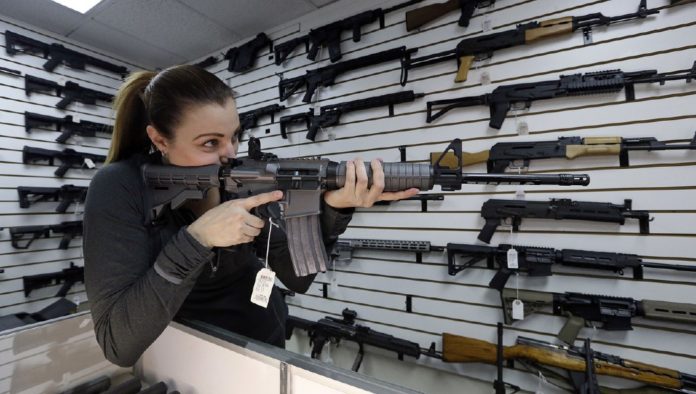The second amendment appears to be winning some major victories after the New York State Pistol and Rifle Association v. Bruen Supreme Court case. The court decided that any restrictions against gun rights must be viewed from the traditional and historical understanding of the amendment when it was written and that a two-step approach to determining the constitutionality of any gun law is now prohibited. This means that lower courts cannot use the “interest of public safety” argument when considering whether gun rights can be restricted. This is not stopping the Biden administration from driving forward with their gun control agenda. Earlier this summer, federal red-flag legislation was signed into law, as were restrictions on which type of firearms eighteen to twenty-one-year-old Americans may purchase. The House also passed an “assault weapons” ban which is awaiting a vote in the Senate. While many gun rights organizations are celebrating the Bruen decision, and rightfully so, leftist radicals are not deterred in their attempts to find new ways to demonize the second amendment and the White people who support it.
In my last article on Critical Race Theory, I argued that one of the biggest problems concerning its use in America are the countless studies conducted, and the papers which are published, which give it an air of scientific legitimacy in the eyes of lawmakers. Critical Race Theory, after all, is a research model used to examine law and social policy, driven by the belief that the civil rights movement failed to correct America’s racist past. A Critical Race approach can be taken to any research topic, as it is a way to “frame” the perspectives of researchers. Critical Race scholars fully admit that race and social justice, as opposed to simply finding the objective truth, are their primary motivations. The second amendment is no exception to this rule and is currently being examined from a Critical Race perspective to show a racial bias among White gun owners when it comes to Black gun ownership. A paper entitled When an Irresistible Prejudice Meets Immovable Politics: Black Legal Gun Ownership Undermines Racially Resentful White Americans’ Gun Rights Advocacy, in the Journal of Experimental Psychology, suggests that White people are resentful of Blacks who exercise their second amendment rights and that White support for gun control, grows in correlation with Black gun ownership.
Most gun-owning Americans who understand the text of the second amendment, and America’s history, do not feel this way at all. The approach this paper takes is something that Critical Race Scholars call a Critical Historical Perspective. This means that any investigation into racial issues will require a “critical analysis of historical data” from a Critical Race approach. When doing race-based research, the goal of CRT scholars is to prove racism exists, and create a new narrative that shows it as a contemporary American phenomenon. They reject objectivity in favor of their own subjective views, which are already biased toward America in the first place. For instance, this paper starts by describing the history of gun-control legislation aimed at Black people in the south after the Civil War. What they don’t mention is that these laws were passed by Democrats, and they helped the KKK in their efforts to terrorize Black people. The paper also fails to mention the fact that Republicans passed a bill that would have protected the rights of freed slaves to own firearms, but it was overturned by a Democrat-controlled Supreme Court.
The problem with research of this nature is not only that is being done to find racism where none really exists, but it is also being done based on what social researchers know about the frailties of the human mind. When a research paper uses the word “framed” they are indicating the use of a clever technique meant to dictate the choices and responses of those being surveyed. This paper, for example, states the issue of concealed carry laws is being framed from the perspective of individual rights/government overreach, or public safety. They are claiming that the results show a racial bias because when gun rights are associated with Black people, White people tend to lead toward the side of public safety and are more willing to support gun control proposals. The truth is that this is a pre-existing bias of the researchers. They believe that White people tend to associate Blacks with high crime rates. The responses which were elicited were influenced by the way the questions were framed. Cass Sunstein writes in his book Nudge: Improving Decisions About Health, Wealth, and Happiness, that framing works as a powerful “nudge” of social behavior because people tend to suffer from some cognitive dissonance when faced with contradictions in their thoughts and beliefs, and they don’t know how to deal with these contradictions, so they are more likely to work within the defined borders of the argument. Framing an argument then works as a form of attitude and/or opinion change, while keeping the issue focused on certain elements that guide society towards the desired end. Looking at it from this perspective alone nullifies any findings because they were manipulated from the beginning.
Another inherent problem with this research is that the surveys given utilized a test known as the Implicit Association Test, which was developed exclusively to identify the hidden, racist attitudes of Americans. It works by measuring people’s responses, in milliseconds, to race-driven questions. Advocates of the IAT claim that it is so effective, that based on its current use, it is safe to say that three out of four Americans harbor hidden racial biases. Like all psychological assessments, this one is rife with problems. Science requires predictable, consistent results before anything can be considered a certainty. This is a rule that is rejected by CRT scholars because they are driven to prove racism exists in all aspects of society. The IAT does not produce consistent results when given to the same individual more than once. Critics of the assessment point out that differences in response times to the questions posed can show a lot of things aside from racial bias. Despite what Sunstein says about framing, people can think on their own. Some people argue that response times can vary because people see the racial nature of the questions and are afraid of being accused of racism. Whatever the case may be, the IAT, like other psychological assessments, is given too much credibility without enough research behind it, to show it proves anything at all. It is just a tool being used by CRT scholars to frame their questions in a way that elicits responses useful to them.
While the second amendment appears to be winning some decisive victories, if we are not careful, the CRT scholars will be able to attach negative connotations of racism to America’s historical tradition of firearm ownership. Not because it is entirely true, but because of the way they are able to manipulate their research and frame the narrative in a way that guides respondents’ answers in a way favorable to their ends. As a student in a Social Work program at Northeastern State University, in Broken Arrow Oklahoma, my professor suggested that it was ok to “nudge” the results of race-based surveys because people don’t know how racist they are. To be fair, the authors of When an Irresistible Prejudice Meets Immovable Politics: Black Legal Gun Ownership Undermines Racially Resentful White Americans’ Gun Rights Advocacy, state this research was not intended to be used in the push for gun control because many Black people legally own firearms, and partake in the firearm culture. What was the point then? To prove we are all racist, that we think our culture was made for us, and that White people are the only ones with rights? That is exactly what they intend to prove, and they will do anything it takes to give it an air of scientific legitimacy.
To learn more about Critical Race Theory and the research methods driving it, check out my new ebook
A Critical Look at CRT in Education, Research, and Social Policy.
![A Critical Look at CRT in Education, Research, and Social Policy: Exposing the Real Racism in America by [David Risselada]](https://m.media-amazon.com/images/I/513bz0a8tZL.jpg)

























